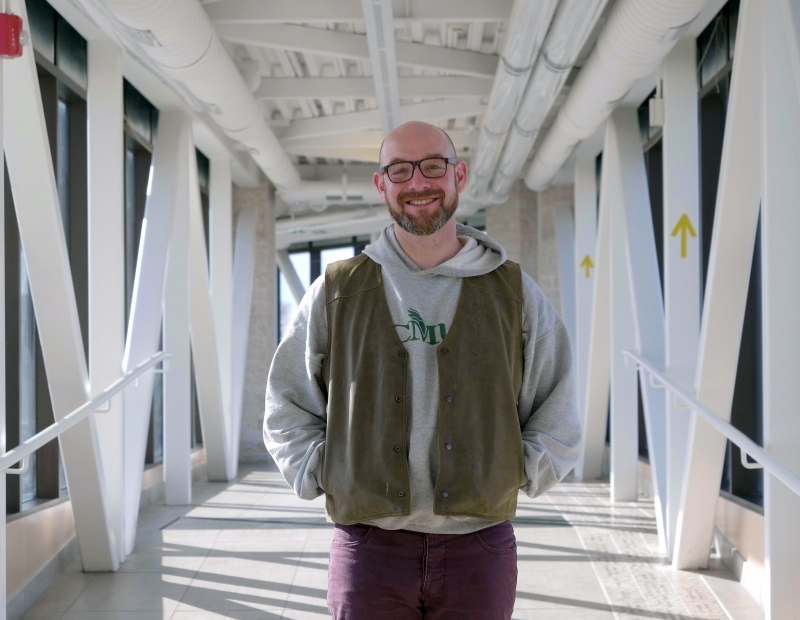
Faculty: In Their Own Words - Dr. Jobb Arnold

Dr. Jobb Arnold, Assistant Professor of Conflict Resolution Studies, has taught at Menno Simons College and CMU since 2015.
What do you love about your work here?
An element I really like about CMU and working here is it's got a practice orientation; people care about what happens in the world. This is really close to my heart, having worked in places like Rwanda and Northern Ireland and indeed here in Winnipeg. There's a lot of people suffering and there's a lot of hurt, so working in the conflict resolution department, one of the things I've always really valued is seeing people's lives change for the better. I think that's something that's not just an intellectual exercise, but it's an applied question of implementation.
My work is primarily based out of MSC, which is a downtown campus, and that's an area in the city that is very vibrant, very diverse, and a lot of the students we have are living in those communities. So I'm really thankful to be able to interact with people who are living in communities, doing good work, and can really take the skills and the training we're giving them and start to put it into practice right away.
What are you teaching right now that you're most excited about?
One of the classes I teach every year is Introduction to Conflict Resolution Studies. That's probably been the most exciting to teach right now because it interacts with students around questions of day-to-day conflict. Under COVID conditions we've all had to adapt in different ways, it's put people under different stressors, and it has exacerbated the inequalities in our society. So just starting to teach the basics of conflict resolution has become a really interesting experience because we're all experiencing a new circumstance. I've learned a lot and I hope students have been able to deal with some of the stressors and some of the challenges that they've faced by using some of these skills that we've been teaching.
What are you researching and writing?
One of my projects, using more of my neuroscience background, is looking at the impacts of drugs like methamphetamines, which have become more prevalent all across Canada and the United States. This impacts people's bodies differently and it really changes the way in which conflict happens. This has become another lens I've been looking through, especially when working with front line staff who are dealing with people who are using drugs. This is something I've been doing training in the community around—I've developed a manual working with some people from within the community and addictions support workers, to provide this information. How does the neurophysiology of certain drugs impact the way conflicts happen and given that, how can we train people to respond?
What are you reading for enjoyment?
Currently I'm reading The Brothers Karamazov. It's one of those books I've been meaning to fully read. It brings together human psychology and spirituality. It's very insightful and profound in lots of ways and also just excellent writing that I enjoy reading.
How do students give you hope?
The field of conflict resolution studies itself really relies on people who are approaching something because they care about it. I'm constantly inspired by the people who come to the program—there's an incredibly diverse range of experiences, which they can bring to the class, which allows us to see these frameworks or theories of conflict in real life. And just to see students grow. Some students come without any idea of what conflict resolution is, so watching them make those connections in their own life and then express it in writing too is a really rewarding experience. When you give people tools or frameworks or ways of seeing the world, that actually opens up new horizons for them that perhaps weren't there before. That's a really rewarding process for me and I really find students to be an energizing part of the work.
What saying or motto inspires you?
The prayer of St. Francis: "Oh Lord make me an instrument of thy peace." Because that just opens up so much and it leaves even so much work to be done. If I can hopefully empower students with the skills and tools they need to do what they need to do in their lives and vocationally, what they take into their communities and their workplaces, those are all things that I think come back to that willingness to be an instrument for something beyond myself.
Printed from: media.cmu.ca/faculty-in-their-own-words-dr-jobb-arnold